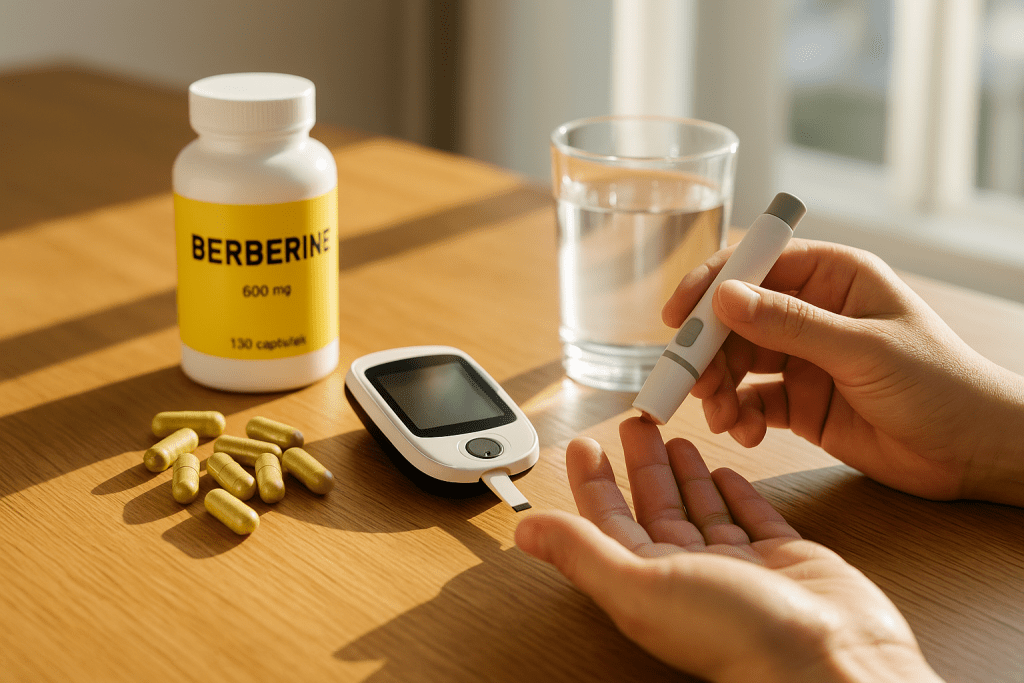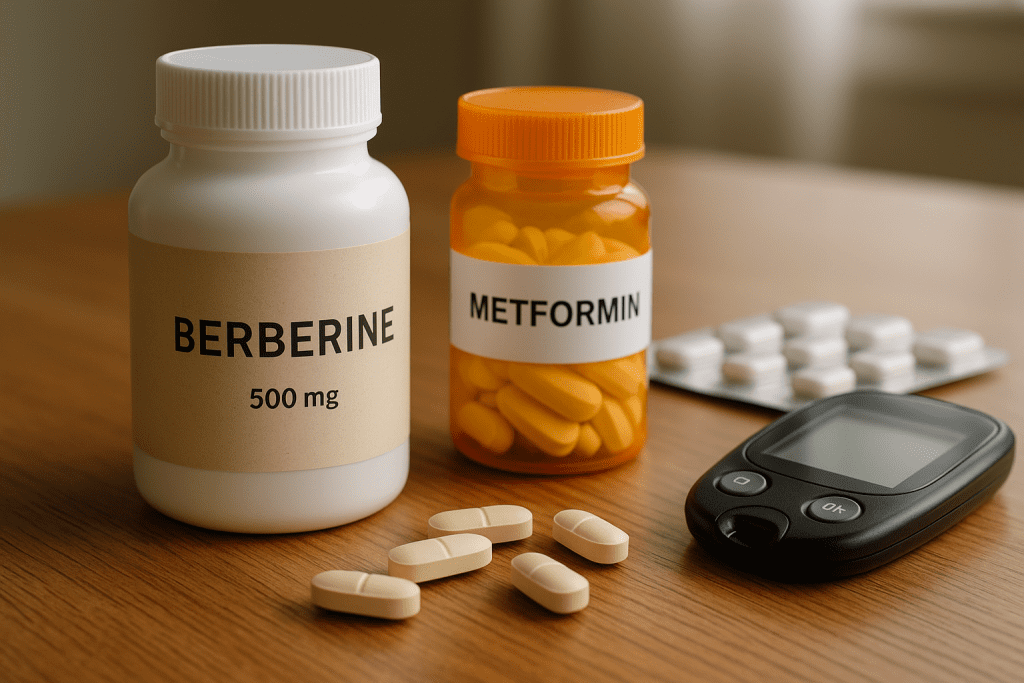Can combining berberine with diabetes medications like metformin cause dangerously low blood sugar? It’s a question more people are asking as this natural blood sugar supplement grows in popularity.
Berberine has well-documented glucose-lowering effects, but stacking it with prescription drugs introduces potential risks.
This article breaks down the interaction between berberine and diabetes medications, the real hypoglycemia risk, and what endocrinologists recommend when using both. You’ll learn what to watch for, how to manage dosage, and which combinations may be helpful—or harmful.
Summary / Quick Answer
Berberine can strengthen the blood sugar-lowering effects of diabetes medications, raising concerns about low blood sugar. However, research shows the hypoglycemia risk may remain modest due to berberine’s glucose-dependent action.
Key Takeaways
- Stronger effects when combined: Berberine + metformin can improve glucose control
- Risk of hypoglycemia: Slightly increased, but lower than many assume
- How it works: Targets blood sugar only when elevated
- Safety tip: Monitor glucose regularly and consult your doctor
- Dosing range: 1,000–1,500 mg/day in divided doses
Let’s explore the science and safety of using berberine with diabetes drugs.
How Berberine Affects Blood Sugar When Used with Diabetes Medications
When used alongside medications like metformin or insulin, berberine may help lower blood sugar further—but this isn’t always a good thing.

Synergistic Glucose-Lowering Effect
Berberine activates key metabolic pathways that overlap with metformin. Both target AMP-activated protein kinase (AMPK), a master regulator of energy balance. Together, they reduce blood sugar more than either one alone.
In clinical studies, patients using both saw:
- Fasting glucose drop by 1.49 mmol/L
- Post-meal glucose drop by 1.89 mmol/L
- HbA1c levels reduced by 0.65%
These outcomes suggest that berberine doesn’t just help—it intensifies the effects of conventional therapies.
| Parameter | Metformin Alone | + Berberine |
|---|---|---|
| Fasting Glucose ↓ | Moderate | Significant |
| HbA1c ↓ | Modest | Greater |
| Insulin Resistance ↓ | Present | Improved |
Emerging data also shows that berberine may raise metformin’s concentration in the body by slowing its metabolism. That means a higher-than-intended drug effect when taken together.
Mechanisms Behind the Interaction
Berberine’s benefits go beyond AMPK:
- Improves insulin sensitivity by reducing inflammation
- Modifies gut microbiota, which plays a role in glucose regulation
- Stimulates GLP-2 secretion, improving intestinal function and metabolism
- Reduces liver glucose production and modulates lipid metabolism
Together, these actions can result in more stable and lower blood sugar—but they also increase the importance of monitoring for symptoms of hypoglycemia.
Hypoglycemia Risk: What the Research Really Shows
One of the biggest concerns when combining therapies is the risk of dangerously low blood sugar. Fortunately, the actual hypoglycemia risk from berberine appears relatively mild.

Risk Level: Lower Than Expected
In a review of berberine combined with oral diabetes drugs, the overall risk of hypoglycemia wasn’t statistically significant. The glucose-lowering effect mostly occurs when blood sugar is already elevated—making it less likely to cause crashes in otherwise stable levels.
Berberine acts more like a smart drug than a blunt instrument. Think of it like a thermostat: it kicks in when glucose rises but backs off when it’s low.
Why Hypoglycemia Risk Is Mitigated
Here’s what buffers the risk:
- Selective activation: Berberine is most active under hyperglycemic conditions
- Beta-cell modulation: It can inhibit insulin release under certain conditions, which paradoxically may protect against low blood sugar
- Gut microbiome effects: Improved metabolic balance leads to fewer blood sugar spikes and crashes
That said, stacking berberine with insulin or sulfonylureas could increase the chance of a low, especially without adjusting doses or increasing monitoring.
If you’ve ever experienced digestive issues from pairing supplements and meds, it may help to read about diarrhea from magnesium and metformin combination—a common but manageable interaction.
Clinical Recommendations for Combining Berberine and Diabetes Drugs
So, should you take berberine if you’re already on diabetes meds? Most endocrinologists say: only with medical supervision.
Expert Guidelines
- Always involve a provider: Never discontinue or replace prescription meds without guidance
- Use it as an adjunct: Berberine may delay the need for insulin in early-stage type 2 diabetes
- Start low and monitor: Begin with 500 mg twice daily and track blood glucose trends
- Try newer versions: Some forms, like berberine ursodeoxycholate, offer better absorption with fewer digestive effects
Practical Tips for Safe Use
| Consideration | Recommendation |
|---|---|
| Dosing | 1,000–1,500 mg/day, in divided doses |
| Monitoring | Regular fasting and post-meal glucose checks |
| Quality | Choose 3rd-party tested products |
| Medical Check-ins | Reassess every 4–6 weeks |
Newer research suggests that combining berberine with metformin may even reduce GI side effects compared to metformin alone. This makes it an interesting option for those who have difficulty tolerating first-line therapies.
However, drug interactions are still a concern. Berberine is known to affect liver enzymes (like CYP450), which can alter how other medications are processed in the body. These metabolic effects underscore the need for caution.
Is Berberine a Safe Natural Blood Sugar Supplement?
On its own, berberine is a promising natural blood sugar supplement. When used correctly and monitored closely, it can be a powerful tool for people managing type 2 diabetes—especially in early or moderate stages.
But it’s not a magic fix, and it’s not without risk. Product quality varies widely, and the lack of FDA regulation means patients need to do more homework.

What to Watch For
- Digestive changes: Berberine can cause nausea or gas in some users
- Drug timing: Take berberine at least 2 hours apart from other oral meds if you’re concerned about absorption conflicts
- Product variability: Choose clinically reviewed supplements whenever possible
Remember, even natural products can cause serious interactions if combined without care. If you’re unsure, speak with your healthcare provider.
Conclusion
Berberine can significantly improve blood sugar control when paired with diabetes medications—but that power comes with responsibility. The berberine diabetes drug interaction has been shown to yield measurable benefits, but also requires attention to hypoglycemia risk, proper dosing, and product quality.
Used carefully, berberine may help some people delay insulin or better tolerate existing treatments. But this approach works best when it’s tailored, supervised, and backed by regular blood sugar monitoring.
For more on managing supplement interactions safely, explore our post on diarrhea from magnesium and metformin combination.

